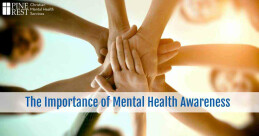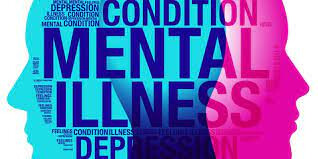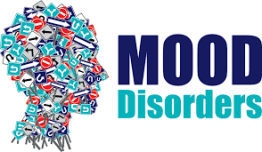The Importance of Mental Health Awareness
May 19, 2022 |
By: Jean Holthaus. LISW, LMSW

Mental illnesses affect 19% of the adult population, 46% of teenagers and 13% of children each year. People struggling with their mental health may be in your family, live next door, teach your children, work in the next cubicle or sit in the same church pew. However, only half of those affected receive treatment, often because of the stigma attached to mental health. Untreated, mental illness can contribute to higher medical expenses, poorer performance at school and work, fewer employment opportunities and increased risk of suicide.
What Exactly is a Mental Illness
A mental illness is a physical illness of the brain that causes disturbances in thinking, behavior, energy or emotion that makes it difficult to cope with the ordinary demands of life. Research is starting to uncover the complicated causes of these diseases which can include genetics, brain chemistry, brain structure, experiencing trauma and/or having another medical condition, like heart disease.
The two most common mental health conditions are:
- Anxiety Disorders - More than 18% of adults each year struggle with some type of anxiety disorder, including post- traumatic stress disorders (PTSD) obsessive-compulsive disorder (OCD) panic disorder (panic attacks) attacks), generalized anxiety disorder and specific phobias.
- Mood Disorders – Mood disorders, such as depression and bipolar depression, affect nearly 10% of adults each year and are characterized by difficulties in regulating one’s mood.
What You Can Do to Help
Although the general perception of mental illness has improved over the past decades, studies show that stigma against mental illness is still powerful, largely due to media stereotypes and lack of education, and that people tend to attach negative stigmas to mental health conditions at a far higher rate than to other diseases and disabilities, such as cancer, diabetes or heart disease.
Stigma affects not only the number seeking treatment, but also the number of resources available for proper treatment. Stigma and misinformation can feel like overwhelming obstacles for someone who is struggling with a mental health condition.
Here are a few powerful things you can do to help:
-
Showing individuals respect and acceptance removes a significant barrier to successfully coping with their illness. Having people see you as an individual and not as your illness can make the biggest difference for someone who is struggling with their mental health.
-
Advocating within our circles of influence helps ensure these individuals have the same rights and opportunities as other members of your church, school and community.
-
Learning more about mental health allows us to provide helpful support to those affected in our families and communities.
~~~~~~~~~~~~~~~~~~~~~~~~~~~~~~~~~~~~~~~~~~~~~~~~~~~~~~~~~~~~~~~~~~~~~~~~~~~~~~~~~~~~~~~~~~~~
Mental illness is real; and it impacts so many lives.

This is no longer a subject that we can sweep under the carpet; but one that we all must engage.
It's an area that impacts professional athletes, actors, spiritual leaders, politicians, teachers and many, many others. And certainly there are those in our personal associations and families as well. It can touch our lives, our loved ones and communities. It's a subject that we all must pay attention to and intentionally engage.
Please understand and note that mental illnesses are diagnosed by qualified professionals.
It is mealy our desire to bring attention to the subject to promote dialogue, care and actions.
Examples of signs and symptoms of emotional disorders and mental illnesses may include:
- Feeling sad down, emotional swings, or expressions of hopelessness
- Confused thinking or reduced ability to concentrate
- Excessive fears or worries, or extreme feelings of guilt or low self worth
- Extreme mood changes of highs and lows
- Withdrawal or avoiding friends, school, family and social activities
- Significant tiredness, low energy or problems sleeping
- Changes in eating habits or lack of appetite. weight swings
And certainly, social media feeds are an area that can provide insight as well
Social media is a community of its own. People have an excess to an endless amount of all kinds of information, biases, opinions and more. And some can take certain information personally, impacting their core values and opinions of certain issues and themselves.
It may provoke a response by an already existing mental illness or personal perspective. Nonetheless, they may respond in various ways. They may recluse, or display some of the symptoms mentioned above. Or even post information that may indicate their adverse intent and actions towards themselves or even others.
Mental illness is a area that we can no longer sweep under the rug, ignore or subject to cultural biases.
For the sake of those impacted by it and those who may be effected by it around them and us, we all must pay attention and engage it appropriately. There is a good chance that somebody in your family, community or the sphere of your influence is impacted by a mental illness. How it plays out in their lives and those around them just may be impacted by our willingness to help them and engaging it.
The consideration is to engage them with caring hearts, connecting them to the appropriate health care professionals if needed. Or notify those professionals who are capable of dealing with them to help and mitigate risk. You just may save some ones life.
Here are a few resources for mental health help, news and information.
Click on them to visit their site
- National Institute of Mental Health
- Mental Health America
- Pine Rest Mental Health Resources
- Maryland Department of Health Behavioral Health Administration
- Maryland Behavioral Health Resources & Services directory
- American Psychiatric Association
- Dawn S. Paramore, LPCMH – Tranquil Solutions for a centered mind
Mental illnesses is not an area that we can afford to sweep under the rug, ignore or subject to cultural biases.
It's an area that impacts a lot of lives in our families, communities and nation. It's an area that should invoke our consideration to engage, help and provide notification and assistance. No, we are not mental illness professionals. But we can express a caring heart towards them and provide information to those in need. And advise other professionals if there are risk to their and others. You just may save some ones life!
And above all, consider checking on those you love and care about today.
You never know what they are experiencing or going through. They just may need to talk or to know that they are not alone and that somebody cares. And encourage them to get professional help if needed. Philippians 2:4
Consider sharing this article with others. The intent to touch and impact lives. Information has the power to do just that!
Consider sharing this article with others. The intent to touch and impact lives. Information has the power to do just that!


